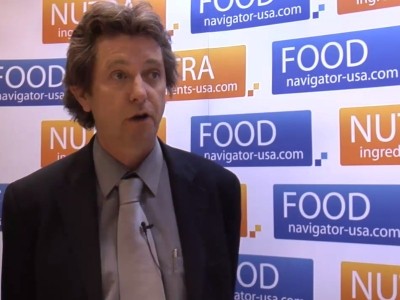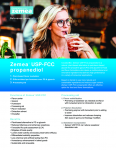Study supports stevia stability and safety in carbonated beverages
According to new data published in the Journal of Agricultural and Food Chemistry, both rebaudioside A (reb A) and stevioside degraded in different soft drink formulations, with up to 70 per cent of the compounds lost under extreme conditions, but at no point was steviol aglycone detected.
Support of stability
The study was welcomed by Mel Jackson, PhD, vice president science for stevia supplier Sweet Green Fields who explained that it is already known that steviol glycosides, such as reb A and stevioside, are not stable under long term storage conditions in acidified conditions typical of those found in some phosphoric acid based carbonated beverages.
On the other hand, these observations came from accelerated shelf life studies, and that other studies have shown that reb A remained stable and acceptably sweet in cola and lemon-lime drinks over 26 weeks of storage (the majority of soft drinks are consumed within 16 weeks of production). “Commercially, stability in carbonated low pH beverages does not seem to be a problem,” said Dr Jackson.
Support of safety
Dr Jackson also noted that the potential of toxicity of steviol aglycone has been debated by the industry, and this has not been conclusively proven. Indeed, some concerns were raised when the compound was reported to produce mutations in the sensitive S. typhymurium TM677 bacterial strain.
However, the real issue, and the one this new study appears to answer, is: “If steviol aglycone has the remotest possible chance of being in any way toxic to humans, could acidified, carbonated beverages be a source of the aglycone, given that humans cannot convert the steviol glycosides to the aglycone?” asked Dr Jackson.
“The answer that the data from this paper suggests is NO, because they could not find, even with extreme conditions conducive to steviol glycoside degradation, that steviol aglycone was formed, either using rebaudioside A as the potential source or stevioside,” he added.
Intense interest
Interest in stevia has been as intense as the sweetness it produces, particularly since the FDA issued its non-objection in December 2008 that the stevia-derived sweetener Reb A is generally recognized as safe (GRAS) as a food additive.
Differentiation must be made between rebaudiside A and steviol glycosides in general. Rebaudioside A, also known as Reb A and rebiana, is a high-intensity sweetener derived from the stevia leaf. It is said to be approximately 200 times sweeter than sugar.
New data
The new study, reported by researchers from the Rheinische Friedrich-Wilhelms-Universitat Bonn, tested the stability of reb A and stevioside in soft drinks after 24, 48, and 72 hours of storage at 80 °C, with particular attention paid to the potential formation of steviol aglycone. The researchers spiked three commercially available soft drinks, including a caffeinated soda, a lemon-lime flavoured soda, and an energy drink.
Results showed that, while significant degradation of stevioside and reb A were observed under such extreme conditions, with up to 70 per cent degraded, no steviol aglycone was recorded.
Safety
The majority of the science around stevia and rebaudioside A are related to its safety. A significant body of research was published online in the peer-reviewed journal Food and Chemical Toxicology (July 2008, Vol. 46, Supplement 1, Pages S1-S92), which found that high-purity reb A from stevia is safe for use as a sweetener for foods and beverages.
An overview in the journal’s supplement by scientists from Coca-Cola, Cargill, and an independent toxicologist said that the studies found the ingredient met all current JEFCA (Joint FAO/WHO Expert Committee on Food Additives) specifications for steviol glycosides.
“The due diligence of the rebiana scientific program reported in this Supplement reflects a commitment by industry partners to, at long last, fully address regulatory requirements for this naturally occurring sweetener by providing the scientific basis to conclude high purity rebaudioside A (rebiana), produced under current GMP to food-grade standards, is safe and appropriate for introduction into the global marketplace,” they concluded.
The FDA issued letters of no objection to GRAS (generally recognized as safe) status for stevia-based Reb A at 95 percent purity or above in December 2008.
Photo-stability
In September 2009 a new study from Coca-Cola reported that its high purity stevia extract (rebaudioside A) does not degrade in beverages on exposure to light. Published in the Journal of Agricultural and Food Chemistry, this research was seen as important for establishing the stability of the Stevia rebaudiana (Bertoni)-derived sweetener rebaudioside A.
The results also challenge an earlier study from the 1980s that reported significant degradation of reb A on exposure to sunlight, equivalent to one week of sunlight during the summer.
Source: Journal of Agricultural and Food Chemistry
Published online ahead of print, doi: 10.1021/jf102894v
“Investigations on the Stability of Stevioside and Rebaudioside A in Soft Drinks”
Authors: U. Wolwer-Rieck, W. Tomberg, A. Wawrzun













